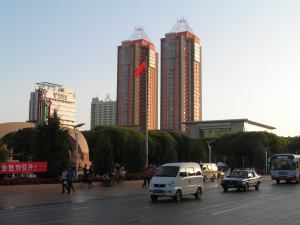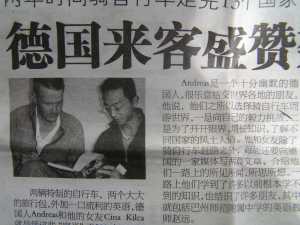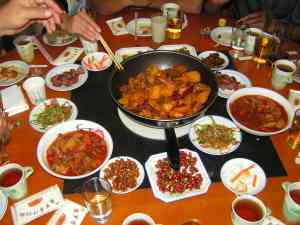
update reports pictures
report 35 report 36 report 37
home
velotour 2004-2006
contact

update
reports
pictures
report 35
report 36
report 37
"Please don't be shocked but your frame has broken again", said Lina, sitting in the shadow of my bicycle on the asphalt for protection against the sun, as I walked back from one of countless watery defecations into a sand dune in the Taklamakan desert.
There in the same place as last year was a little fault line was visible in the welded seam of the aluminium frame. We were right in the middle of the desert. We should have panicked, for in the old days of the Silk Road people feared death in this unforgiving desert.
Luckily the frame lasted another 200km until it finally broke just as we rode into the little oasis town of Charklik (Ruoqiang), only 300m from an hotel. Ironically the previous frame had broken at more or less the same place in the same Chinese province of Xinjiang. A broken frame is the worst disaster that can befall a cyclist. Our aluminium frame was irreparable. We confronted the producer of our bicycles in Germany with our problem by telephone, and he agreed immediately to send free of charge a new frame from Germany, as he had done a year earlier.

|
But in the little town of Charklik nobody was able to write the name of our hotel in Pinyin (a phonetic version of Chinese which uses the western alphabet). They could only write the address in Chinese characters. In Germany people are able to distinguish Pinyin, it can for instance be used as an address even without being understood, but very few Germans can do the same with Chinese Characters. This is why it is so difficult to receive articles in China. The package containing our frame had already been in the customs in Beijing for two weeks. We were rapidly getting frustrated, fearing the onset of winter would upset our progress across country.
We decided to take a bus 450 km onward to the big city Korla in order to get help to gain customs clearance for the new frame. We were surprised to see Joan and Brian, an English couple, board our bus in Charklik. They were both 70 years old and they were travelling independently for two months right across China via the Southern Silk Road from Kashgar to Beijing. We admired them, because people of their age normally demand the security and ease of an organised group travel.
As we left the bus in Korla we got a proper cultural shock after the catastrophic conditions we had just encountered in India and Pakistan. The rich oil and gas resources of the area had brought enormous prosperity and the many sky scrapers reminded us of the German city Frankfurt. Korla is situated at a key point in the province of Xinjiang in the west of China where the North and South Silk Roads meet. It has about 400.000 inhabitants, but despite the size of the city and its importance to the surrounding desert it has few tourist attractions. In consequence there was not even a mention in famous guidebooks for travellers like the Lonely Planet.

|
Finally we got our frame with the help of another Englishman, David. He now lives here in Korla in a comfortable flat with four rooms, which costs only 600RBM (60 EURO) per month and he gave us a place to sleep. He runs a dried tomato business, exporting them to Europe. But he doesn't make much money because he operates at the lower end of the chain of trade.
A young Chinese gentleman Michael was staying and studying with David to improve his English. (His real Chinese name is different, but he adopted the first name of his American basketball idol Michael Jordan because we couldn't pronounce his Chinese name). He helped us a great deal when ever we needed him.
Despite the size of the city only two or three westerners live there. David is very famous in this area as a go between. Soon a journalist came to us for an interview and the next day there was an article about us in a famous Korla newspaper.

|
During the Chinese national holiday we decided to go on to the tourist town of Turpan with Michael. To our amazement Brian and Joan were on the same bus and the five of us checked in at the same hotel and spent a fine holiday together, conversing in English, and, eating in restaurants chosen by Michael where he introduced us all to a seemingly endless variety of new food.
The cost of living here in Korla is very low, two people can eat in a good restaurant with drinks for only 30 RMB (3 EURO). A taxi for several kilometres costs only 5RMB (0.5 Euro). You can get half a litre of Chinese "white wine" in a restaurant for 10RMB, in reality it's a spirit with 50% alcohol. Chinese people drink a lot in this area. In the evening there is a bottle on almost every table, and the restaurants are in consequence very lively.
Chinese people are very hospitable and polite and they often invited us for lunch or dinner. Most of the restaurants have separate rooms with a big round table. On the table is a moving circular glass pane, the different dishes selected are put on the pane and everyone serves themselves as they fancy. This system makes for a huge variety of different foods each meal. But we took time to get used to specialities like meat from donkeys, necks from geese or heads from fish. Fortunately we didn't here have to eat dog meat, though it exists here too.
Whilst we waited of our frame from Germany to clear customs we tried to learn Chinese. The language is absolutely exotic and has no similarity whatever any European language. The language has many words with the same basic pronunciation but meaning quite different things distinguishable only by the tonal pitch and slurring with which they are spoken. Four different tones are used in Chinese speech. When you don't use the correct tones people don't understand you. Without a good teacher it is almost impossible to learn this language. It becomes ever more difficult when considering reading and writing because the Chinese characters have more link with meaning than with the pronunciation.
Because of the long enforced break resulting from the broken frame and further delays due to the onset of winter we are running out of money and are trying to get a job as German or English language teachers. The Beijing Olympic Games in 2008 are fast approaching and trade with foreign countries is growing rapidly so very many people here want to learn English. We feel we have a good chance of finding a job.
andreaslina@yahoo.de